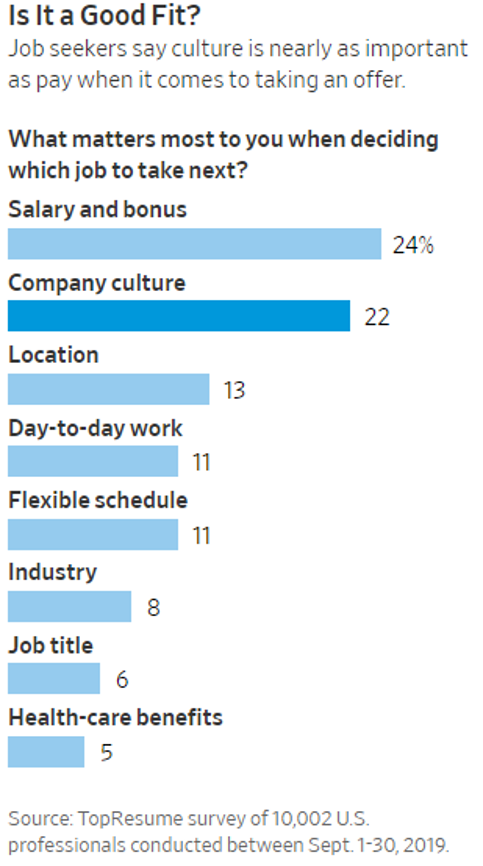
PHOTO: JAMES KACZMAN Source: The Wall Street Journal
As a new year begins, you may be tempted to switch employers in this red-hot job market.
Don’t rush. You should decode the culture of your next workplace before accepting what looks like an attractive management role, career experts say. An inadequate assessment can lead to a misfit, they caution, and you are less likely to thrive in an incompatible culture.
Simply put, corporate culture consists of the prevailing beliefs and behaviors that guide workplace interactions. “About 30% of executives taking new jobs fail to figure out the company’s culture correctly and end up leaving relatively soon,’’ said Peter Crist, chairman of executive-recruitment firm Crist/Kolder Associates.
In rarer instances, some who stay are thrust into a change-agent role. Amazon.com Inc. veteran Sebastian J. Gunningham joined WeWork as a vice chairman in 2018 and soon also became its chief automation officer as the then-highflying startup was growing at breakneck speed and sported one of the startup world’s biggest valuations. He said he found it harder than he expected to help WeWork develop a customer-focused culture like Amazon’s.
The office-sharing startup named Mr. Gunningham co-chief executive in September to succeed its charismatic co-founder Adam Neumann. Investors had blanched at WeWork’s steep losses and Mr. Neumann’s eccentric leadership style, and WeWork’s parent, We Co., had to scrap its public offering.
“I obviously did not do enough homework on the culture decision,” Mr. Gunningham said of his move to WeWork. His advice: “Make good cultural decisions before you move from company to company.”
“Posing the right set of questions is your best bet for getting a candid read on whether a company’s culture is open to outsiders,’’ said David Reimer, chief of the Americas region at Merryck & Co., a leadership-development firm.
Here are five strategies to uncover both red flags and positive signals about a corporate culture, based on advice from nearly 20 recruiters, career coaches and executives:

Source: The Wall Street Journal
Identify Who and What Count
To grasp unwritten norms, discern what is acceptable behavior—especially for rainmakers, said Gail Meneley, co-founder of Shields Meneley Partners, a career-transition firm. She recommended inquiring whether sales stars operate under looser standards, such as completing deals without required internal approval.
“You may feel uncomfortable working for a business where there are different rules for different people,’’ she cautioned.
Small but significant gestures can offer hints about what behaviors matter. In 2017, Brad Neuenhaus became chief business officer of MindEdge Learning Inc., a provider of online education. He did so partly based on a company lunch he had attended as a customer. He recalled being impressed when a MindEdge leader exhibited respect for employees by clearing their plates.
“I wanted to be part of their organization,” Mr. Neuenhaus said. “Culture starts at the top.’’
Grill Recruiters About Suitability
A recruiter who has handled placements for your target employer should know whether its culture would suit you, Mr. Crist said. He suggested asking him or her “why the five previous people you recruited (there) were successful.”
In hindsight, Julie Currie wished she had quizzed the search firm differently before joining a company’s human-resources department. “I should have asked why other individuals had left the role, and what was the leadership turnover and why?”
Ms. Currie left that company after a brief stint and now runs human resources for the biggest unit of Western Digital Corp., a memory-chip maker.
Make Sure Actions Match Promises
One media-industry executive who left her last employer after a brief tenure says that, before joining, she should have pressed that company’s board about why management had avoided changes needed for its turnaround. She realized that she and board members had different expectations about how the company could thrive.
After that experience, she says she conducted deeper cultural dives during her latest job hunt. She has just begun a new executive position in the technology industry.
Brian Newman agreed to quit PepsiCo Inc. for the top finance job at United Parcel Service Inc. in 2019 after UPS CEO David Abney “did an incredible amount of due diligence on me in a short period of time,’’ he recalled.
Getting hired within weeks by a shipping giant that long preferred homegrown management talent convinced Mr. Newman that Mr. Abney “was truly committed to transformation,’’ he added. The new CFO began in September.
Request a Temporary Consulting Gig
Businesses rarely let management candidates attend meetings and gain close looks at how key players operate. Yet tech-industry executive Tissa Richards did so by consulting for Armory, a software startup that she could see herself joining permanently. “It’s kind of like dating someone before you marry,’’ she said.
Armory gives staffers unusual freedom to pursue projects and access to sensitive data such as workforce compensation. After attending numerous company meetings during her 2019 projects, Ms. Richards concluded she enjoys Armory’s culture of empowered autonomy and transparency.
Walk the Halls
Some managerial applicants ask rank-and-file staffers what it is like working for their prospective employer. A former UPS executive at a logistics company regretted not doing so with administrative assistants before taking his position several years ago.
He later discovered his boss had gone through 12 assistants in the prior 14 months. The executive stayed less than a year. “I failed the most in assessing the cultural fit,’’ he said.
UPS declined to comment.
While walking around corporate offices, also heed unspoken cues, advised Joelle K. Jay, an executive coach. Notice whether employees smile at you or avoid eye contact.
“Pay attention to your internal warning systems,’’ Ms. Jay said. ”How would you feel about
Source: The Wall Street Journal, January 16, 2020 | Joann S. Lublin